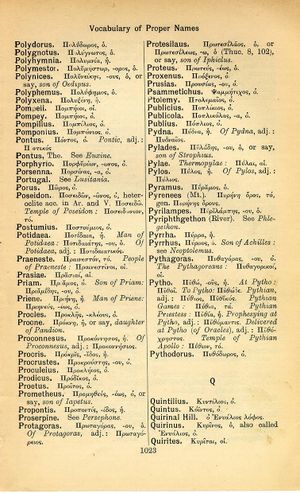Praeneste: Difference between revisions
οὐκ ἐπιλογιζόμενος ὅτι ἅμα μὲν ὀδύρῃ τὴν ἀναισθησίαν, ἅμα δὲ ἀλγεῖς ἐπὶ σήψεσι καὶ στερήσει τῶν ἡδέων, ὥσπερ εἰς ἕτερον ζῆν ἀποθανούμενος, ἀλλ᾿ οὐκ εἰς παντελῆ μεταβαλῶν ἀναισθησίαν καὶ τὴν αὐτὴν τῇ πρὸ τῆς γενέσεως → you do not consider that you are at one and the same time lamenting your want of sensation, and pained at the idea of your rotting away, and of being deprived of what is pleasant, as if you are to die and live in another state, and not to pass into insensibility complete, and the same as that before you were born
m (Text replacement - "}}]]" to "}}]]") |
m (Text replacement - "(|thumb)\n(\|link=)" to "$1$2") |
||
| Line 1: | Line 1: | ||
{{WoodhouseENELnames | {{WoodhouseENELnames | ||
|Text=[[File:woodhouse_1023.jpg|thumb | |Text=[[File:woodhouse_1023.jpg|thumb|link={{filepath:woodhouse_1023.jpg}}]]Πραινεστόν, τό. | ||
|link={{filepath:woodhouse_1023.jpg}}]]Πραινεστόν, τό. | |||
<b class="b2">People of Praeneste</b>: Πραινεστῖνοι, οἱ. | <b class="b2">People of Praeneste</b>: Πραινεστῖνοι, οἱ. | ||
Revision as of 17:01, 18 May 2020
English > Greek (Woodhouse)
Πραινεστόν, τό.
People of Praeneste: Πραινεστῖνοι, οἱ.
Latin > English (Lewis & Short)
Praeneste: is, n. and f., = Πραίνεστος or Πραίνεστε,
I one of the most ancient and important cities of Latium, famed for the beauty of its roses, for its nuts, and still more for its temple of Fortune and the oracle connected with it, now Palestrina; abl., Praeneste, Cic. Planc. 26; Hor. Ep. 1, 2, 2: Praeneste sub ipsā (sc. urbe), Verg. A. 8, 561: altum Praeneste, id. ib. 7, 682: frigidum, Hor. C. 3, 4, 22: sacrum, Stat. S. 4, 4, 15.—Hence,
II Praenestīnus, a, um, adj., of or belonging to Prœneste, Prœnestine: nuces, Cato, R. R. 8: urbs, the town of Prœneste, Verg. A. 7, 678: Praenestinae moenia sacra Deae, i. e. Fortunae, Ov. F. 6, 62: sortes, the oracles of Prœneste, Cic. Div. 2, 41, 86: ager, id. Agr. 2, 28: rosae, Plin. 21, 4, 10, § 16: via, from Rome to Prœneste, id. 31, 3, 25, § 42.—Subst.: Prae-nestīni, ōrum, m., the inhabitants of Prœneste, the Prœnestines, Plaut. Truc. 3, 2, 23; id. Trin. 3, 1, 8 Brix ad loc.; Liv. 6, 21 sq.; v. Ritschl, Opusc. 2, 372.
Latin > French (Gaffiot 2016)
Prænestĕ,¹² is, n. (f., Virg. En. 8, 561 ), Préneste, ville du Latium : Cic. Cat. 1, 8 ; Virg. En. 7, 682 ; Hor. O. 3, 4, 22 || -īnus, a, um, de Préneste : Cic. Agr. 2, 78 || subst. m. pl., habitants de Préneste : Liv. 6, 21.
Latin > German (Georges)
Praeneste, is, n., Stadt in Latium, wahrscheinlich Kolonie aus Sullas Zeit (s. Cic. Cat. 1, 8. Gell. 16, 13, 5), berühmt durch die Schönheit der dortigen Rosen u. Nüsse, bes. aber durch den Tempel der Fortuna u. das damit verbundene Orakel, j. Palestrina, Varro LL. 5, 32 u. 6, 4 (wo Abl. e). Cic. Cat. 1, 8; Planc. 63 (wo Abl. e). Prop. 2, 32, 3 (wo Abl. i): wegen seiner hohen Lage altum Pr., Verg. Aen. 7, 682, u. frigidum, Hor. carm. 3, 4, 23. – fem. b. Dicht., wie Verg. Aen. 8, 561. – Dav. Praenestīnus, a, um, pränestinisch, aus Präneste, ager, Liv.: nuces, Cato: rosae, Plin.: urbs, Stadt Präneste, Verg.: sortes, die pränestinischen Orakelsprüche, Cic. u. Suet. – subst., ein Pränestiner, Praenestinum opino (= opinor) esse, ita erat gloriosus, Plaut. fr. bei Non. 474, 32: Plur., Praenestīnī, ōrum, m., die Einw. von Präneste, die Pränestiner, Cic. u.a.

